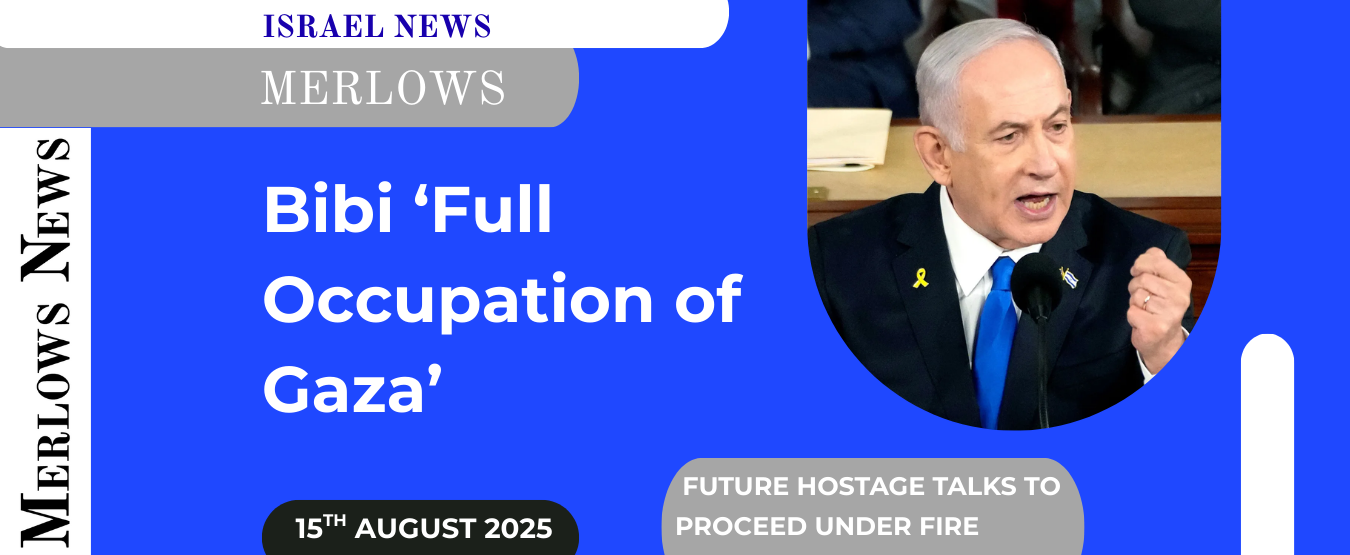Israeli Prime Minister Benjamin Netanyahu has reportedly decided to press forward with a full occupation of the Gaza Strip, despite rising internal dissent and grave risks to hostages, civilians, and Israel’s international standing.
The move comes as intense frustration mounts over stalled hostage negotiations and Hamas’s refusal to engage in meaningful diplomacy.
A Turning Point: “Clear and Hold” Replaces “Clear and Leave”
According to Israeli media, Netanyahu has shifted from temporary raids toward a broader strategy: occupy and hold Gaza indefinitely, even in sectors where remaining hostages are held.
The Prime Minister’s Office reportedly made clear: “There will be operations even in areas where hostages are being held—if this does not suit you, Chief of Staff, you should resign”.
This strategy represents a dramatic escalation. While Israel currently controls approximately 75% of Gaza, the proposed plan would extend that control to encompass the entire enclave—moving civilian populations southward, erecting military governance structures, and limiting humanitarian aid access in an effort to isolate Hamas’s power
The Australian.
Why Now? Hostage Deal Deadlocked
Netanyahu’s decision comes amid a collapse of indirect ceasefire negotiations mediated by the U.S., Qatar, and Egypt in Doha. Hamas has withheld cooperation, reportedly making unreasonably expansive demands. U.S. envoy Steve Witkoff characterized the latest response as evidence of “a lack of desire to reach a ceasefire”.
In response, Netanyahu has publicly insisted that future hostage negotiations must proceed under fire, signaling a refusal to halt military operations before hostages are released.
He emphasized that his priority is clear: defeat Hamas, recover hostages, and eliminate the Gaza threat to Israel.
Internal Backlash: Military Leadership and Former Officials Push Back
Not all of Israel’s leadership supports this new direction. IDF Chief of Staff Lt. Gen. Eyal Zamir reportedly opposes full occupation, warning of prolonged conflict, operational strain, and deep jeopardy to hostage lives. He even postponed a planned U.S. visit amid growing disagreement with the Prime Minister’s office.
A group of 19 former Israeli security and intelligence officials, together with hostage families, have publicly called for a diplomatic solution instead—arguing that continued military escalation could further imperil hostages and erode Israel’s ethical and legal standing.
The Humanitarian Abyss: Occupation Risks Deepening Crisis
The Gaza Strip is already suffering an acute humanitarian collapse. Over 60,000 Palestinians have died, thousands more remain internally displaced, and hundreds of children have perished due to malnutrition.
UN agencies warned that Netanyahu’s proposed plan to move civilians into designated “aid hubs” and restrict access to those unable to reach them directly could violate international humanitarian norms and further endanger vulnerable populations.
Strategic Risk vs. Political Reward
Strategically, Netanyahu’s escalation carries profound risks. It may galvanize Hamas or its residual elements to carry out desperate acts—including executing hostages to derail Israeli advances. Critics warn of logistical nightmares: occupying Gaza implies long-term governance, reconstruction, and responsibility for a civilian population now sealed within Israeli control.
Politically, analysts see Netanyahu’s move as partly driven by domestic coalition pressures. Far-right ministers in his government have insisted on dismantling Hamas entirely, even if that means risking fragile hostage negotiations
The Australian.
Israel’s Alternatives: What Simply Isn’t Working
The alternative—pursuing a ceasefire deal to retire some hostages in exchange for a pause in hostilities—has so far failed. Netanyahu reported “some progress” earlier in the year, but refused to publicly commit to stopping the fighting as part of any deal.
Instead, Israeli forces continue operations even amid stalled talks, which hostages’ families argue amounts to unnecessary prolongation of pain.
With talks broken down and Hamas moving to shift mediation away from Egypt and Qatar toward Turkey, Netanyahu now faces a choice: renegotiate from a position of strength, or seize Gaza by force—a choice with no guaranteed outcome but immense consequences either way.
A Strategic Judgment: Will Force or Diplomacy Deliver?
From the vantage of MERLOWS.com, the strategic goal is not regime change—it is peace through strength, trade, and negotiated exit. A full occupation might deliver short-term political gains, but at great cost: increased civilian suffering, longer insurgency risk, international isolation, and the potential death of hostages.
Meanwhile, hostage retrieval through negotiation—even while under military pressure—remains the most humane and diplomatically defensible path. It also maintains the option for future stabilization and quicker post-war reconstruction.
Yet Netanyahu appears committed to military escalation, perhaps as leverage to force negotiation—but at the risk of closing off diplomatic channels entirely if casualties mount or global censure intensifies.
Conclusion: A Critical Inflection Moment
Netanyahu’s decision to pursue full occupation of Gaza, particularly where hostages remain, is his boldest—and potentially most desperate—move yet. It is a high-stakes gamble that reflects a wider ideological choice: force first, diplomacy later—or diplomacy constrained within conditions set by military action.
For families of hostages, there is no easy answer. They demand action, yet fear escalation. For the Israeli state, the decision marks a strategic inflection: pursue a morally ambiguous victory with heavy humanitarian costs—or preserve limited options for compromise and hostage release without total destruction.
MERLOWS.com will continue to monitor developments, offering analysis rooted in military realism, moral clarity, and belief in the power of peace through strength and trade—because genuine security demands both resolve and restraint.







Thanks for sharing this information is useful for us.
Glad to be of service.